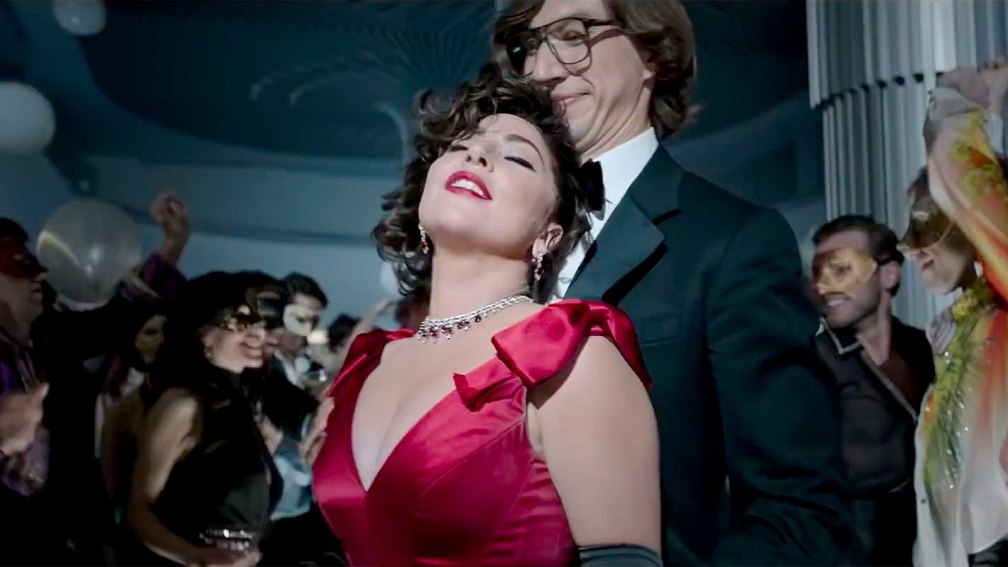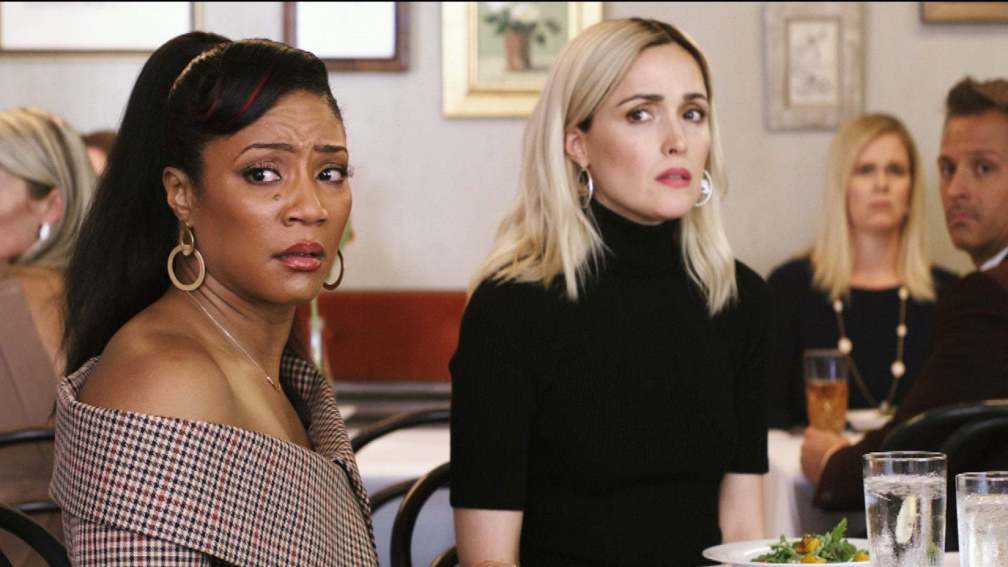Cast: Lady Gaga, Adam Driver, Jared Leto, Jeremy Irons, Salma Hayek, Al Pacino
Director: Ridley Scott
Writers: Becky Johnston, Roberto Bentivegna
Imagine if the Corleone family in The Godfather were run by the Bluth family in Arrested Development; that’ll get you close to what House of Gucci is. The film tells a scandalous story of greed, seduction, betrayal, and murder in a world of opulence, glamour and dirty, sexy money where every character is a comically despicable and inept nincompoop. At least, that’s what the film seemingly aspires to be, and so it should. A high-budget soap opera with A-list actors delivering ostentatious performances certainly sounds like a good time to me and Ridley Scott is one of the few directors working today with the clout, the talent, and the will to actually make it. And the sumptuous excess of it all is certainly there in the film he’s made; the world of House of Gucci is an often dazzling one of slick suits, elegant purses, and luxurious villas in the Italian countryside that often clashes with how surprisingly unremarkable the rest of the film feels in comparison. With a screenplay that needed more work and a director whose voice feels largely absent, House of Gucci hasn’t much to it beyond the lavish ambience and the total commitment of its cast. The movie is essentially fine, but it’s a far cry from the delicious, campy melodrama that was promised.
The story is that of Maurizio Gucci (Adam Driver), heir to an Italian fashion dynasty and his marriage to Patrizia Reggiani Gucci (Lady Gaga), a middle-class woman with cut-throat ambition. Their marriage would end nearly twenty years after their meeting in 1976 with Patrizia hiring a hit-man to murder her magnate husband. Before then, the film recounts the initial union that caused Maurizio’s disapproving father Rodolfo (Jeremy Irons) to cut him off, the couple’s engulfment into the family business when Maurizio’s uncle Aldo (Al Pacino) takes him in as his protégé, and the ruthless schemings and Machiavellian plots that follow as Patrizia sets out to take the Gucci empire for herself and Maurizio. And so they find themselves in the midst of a familial clash, with Aldo on one side desiring profit above all else to the point that he’s willing to sell cheap Gucci knock-offs for a tidy sum, Rodolfo on another who wishes for Gucci to remain an exclusive, deluxe brand worn only by the likes of Grace Kelly and Sophia Loren, and Aldo’s idiot son Paolo (Jared Leto) on his own third side looking into the future with new, bold, garish designs. Patrizia wants it all to herself however and to get there, she will turn the sheepish, reserved Maurizio into the stone-hearted businessman she desires him to be.
So if stars and their performances are to be the big draw for House of Gucci, there is at least plenty to enjoy there. Signora Gaga, who spoke much in her publicity tour about the method that went into capturing Patrizia’s character, goes all in with the duplicitousness and depravity, never giving an inch for fear that she may not be viewed sympathetically. As far the accent goes, I’ll only say this: I think it’s easy to dunk on an actor’s accent for sounding fake just because we know objectively that it is fake in the same way that it’s easy to call an image that we know was made with CGI fake. Yes, Lady Gaga does sound like Dracula, and for that reason maybe the voice was a bad call, but it really isn’t very dissimilar to how the actual woman sounds. But I’m getting a little off topic here. Ramping it up with Gaga are Pacino, Driver, and above all Leto. Each in their turn offers a style of acting that clashes with the other, making for some fascinating dissonance. Leto, looking and acting like the love child of Fredo Corleone and Waluigi, is all over the place with his unpredictable inflections and distinct eccentricities. While Leto is an actor who seldom does it for me, his level of kookiness is in sync with the wavelength this movie is going for and there is something slightly satisfying about watching him play this sad, pathetic loser, “a triumph of mediocrity” to quote Rodolfo.
At 157 minutes long, House of Gucci simultaneously has too much to do and not enough time to do it. For a chronicle about one of the great fashion dynasties, there is shockingly little discussion of fashion and what exactly it is that makes Gucci’s brand so high-class and unique. For a real-life story that climaxes with the lead character conspiring to have her husband killed, the scenes depicting the eventual plot and its violent end, including Salma Hayek in the role of Patrizia’s psychic reader and co-conspirator, feel very tacked on. House of Gucci would likely have fared better as a 6 episode miniseries on FX than as a two-and-a-half hour movie (though good luck keeping it out of Ryan Murphy’s hands in that scenario) as much of the story feels underdeveloped. As masterful a director as Scott is (just look at The Last Duel from the same year), the case is often that he is only as good as the screenplay he is given, and the screenplay by Johnston and Bentivegna needed a lot more ironing out and a stronger throughline before it could be ready to be turned into a film. For what they actually made, a tighter, shorter edit might have helped to alleviate the portions where the film seriously drags, but it still wouldn’t have brought out the kind of movie they were clearly trying to make.
In the middle of this garbled mess a movie though, there are many pleasures to be found. The stylish outfits (Driver in his cable-knit jumper and huge spectacles and Gaga with her furry winter hat when they go vacationing in the Alps is an all-timer), the unconventional soundtrack (including an Italian cover of ‘I’m a Believer’), the cheesy and baffling dialogue (“It’s time to take out the trash”); there are so many many instances where you just have laugh. Of course, you need the actors hamming it up to make it even remotely watchable and that is the movie’s greatest strength. It’s a type of performance that doesn’t get a lot of praise in a moviegoing culture that has come to favour greater realism in their films and therefore greater naturalism in their actors. That kind of acting is great and all, but there’s nothing quite like watching a larger-than-life performer deliver a spectacle of acting that’s more grandiose, more bombastic, and more ridiculous than anything you could ever hope to see in the real world. In a movie that is all about a family of over-the-top personalities warring over their shared name and legacy, this epic clash of overacting is exactly what’s needed to bring that dynamic to the forefront. If only they had a script that could keep up with them, what a treat House of Gucci would have been.
★★★


